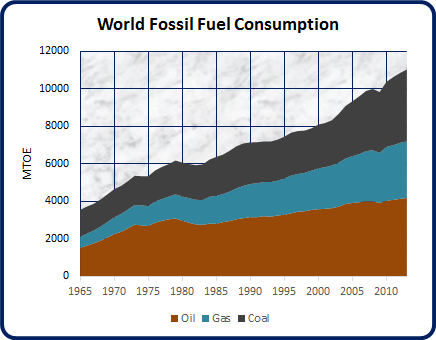Environment & Energy
Related: About this forumSustainability Crisis: Renewable Resources Growth Has Been Maxed Out Since 2006
Here's some more evidence showing the impossibility of infinite growth on a finite planet.
To make the point that existing renewables may be maxed out, researchers from Michigan State University (MSU), the Helmholtz Centre for Environmental Research (UFZ) in Germany and Yale University analyzed the production and extraction rates of 27 global renewable and non-renewable resources. They examined 20 renewable resources, such as corn, rice, wheat or soy, which represent around 45 percent of the global calorie intake according to the Food and Agriculture Organization of the United Nations, as well as animal products, such as fish, meat, milk and eggs.
The annual growth rate of 18 of these renewable resources - for example, increase in meat production or fish catch -- peaked around 2006. Surprisingly, they discovered not only that 20 resources had a peak-year but also that for 16 of the 20 resources with a peak year, the peak year lay between 1988 and 2008 -- a narrow range in the history of mankind.
There are several reasons why many of the peak years occurred during the same time period or "synchronized," Liu said.
First, multiple resources such as land, food and energy, are consumed simultaneously to meet different needs of rapidly growing populations and diet changes worldwide. Second, producing one resource needs other resources. For example, food production needs land, energy and water. Third, producing resources creates pollution, which exacerbates resource shortages. Fourth, extracting less accessible resources results in an increased ecological and economic cost per unit extracted, thus lowering the availability of the remaining resources.
Liu said this does not speak to hopelessness. Rather, it's a call to not be simplistic when seeking solutions and to acknowledge that all resources come with costs, and that the costs may not be immediately obvious, and span the globe.
bananas
(27,509 posts)GliderGuider
(21,088 posts)
bananas
(27,509 posts)and distracted from the real problems and solutions.
GliderGuider
(21,088 posts)The world has never been in this situation before, so there's not a lot of history to guide us. We'll make mistakes as we try to figure out what's happening - we always have, and we always will.
bananas
(27,509 posts)FBaggins
(26,758 posts)Here's hoping the stock market does too... but not the presidency. ![]()
bananas
(27,509 posts)Nihil
(13,508 posts)> Population growth rate peaked in 1962
>> The annual growth rate of 18 of these renewable resources - for example, increase
>> in meat production or fish catch -- peaked around 2006.
![]()
GliderGuider
(21,088 posts)On reflection, it looks to me like this is actually a good finding. See my comment below about the apparent innumeracy of the researchers.
FBaggins
(26,758 posts)Show a malthusian a graph of any resource or commodity that hits a new high and then retreats... and he'll tell you why that was actually a "peak" that represents an immutable maximum. It hasn't fallen because of falling demand caused by global economic weakness... it's because we've hit the limit for how much can be produced and it's all downhill from here.
When new highs are put in a few yeas later, he insists that he wasn't "wrong"... he was "early" and the new high is just even more unsustainable production that will make the eventual collapse that much worse.
And in this case it isn't even always an actual decline... just a decline in the rate of growth. Which, to the malthusian, is just as good as proving a peak - since the only contrary position that they'll admit exists is a "cornucopian" strawman that believes in only exponential growth without limits.
GliderGuider
(21,088 posts)The researchers appear to be innumerate. They apparently didn't look at peak production rates of any of the commodities. Instead, they looked at peak growth of production rates. In other words, they seem to have looked for the second derivative going to zero, and read all kinds of dire portents into it. If they had looked instead for the first derivative going to zero, they might at least have found some peaks in the classical sense.
In other words, the study looks like a stink bomb. My apologies for not reading it for comprehension before posting it.